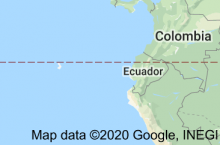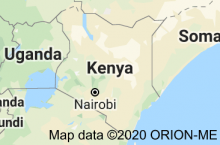Stony Brook PA Program Provides Compassionate Care Worldwide
by Edward Giarrusso, MPAS, PA-C, DFAAPA
Jan 13, 2020
Our program's interest in international healthcare began more than 25 years ago with a medical mission to Guatemala, and the interest continues to grow. Each mission is different. But they all include taking care of the very poor, underserved people who have very little and depend on help from the outside world. Our students leave the experience with strengthened medical knowledge, insight into the need for and delivery of healthcare in a third-world country, and a number of unique, unforgettable experiences that are sure to make them more caring healthcare providers.
Here's a look back at our mission trips so far.
Guatemala
In 1996 the Glens Falls Medical Mission Foundation began, with a small group of local physicians, a dentist, a pharmacist, and others who wanted to give back to an area in the developing world that was in real need of ongoing medical care. With help from the Guatemalan Lions Club this mission travels to Nueva Santa Rosa, an extremely underserved community 1.5 hours from Guatemala City. For more than 25 years our program has offered our students the opportunity to apply for the program international fellowship to Guatemala. Each year one faculty member and two or three students are selected based on their knowledge, an essay and past experience in an underserved community, and offered the opportunity to participate in the medical mission. Through the years, the project expanded from a purely medical one to one that affects many aspects of life in this area. It became obvious to the mission that providing only medical care was, quite literally, a band-aid approach to the extensive needs of a community that did not have even the most basic services of clean water, sewage and emergency services. Typically, each mission consists of 40 or more volunteers from various parts of the country. The volunteers are physicians, PAs, nurse practitioners, nurses, dentists, podiatrists, EMTs, translators, pharmacists, educators and general volunteers who help set up the clinics. The clinics are divided into a female room, a pediatric room and an adult medicine room. In the female room, practitioners perform pelvic exams, give patients birth control and provide prenatal care. The pediatric room sees children with various medical conditions: simple upper respiratory infections, malnutrition, unusual conditions such as Epidermolysis bullosa and familial hypercholesterolemia. The clinic also treats children with congenital abnormalities who cannot be cared for in this underserved community. The adult medicine clinic sees patients with a host of medical conditions—either chronic or new onset hypertension or diabetes, chronic leg ulcers, musculoskeletal complaints from their hard work in the fields and acute and chronic diarrhea. During the week the mission cares for between 1,500- 2,000 patients.
Ecuador
In the Spring of 2011, eleven students, one faculty member and two Stony Brook PA program alumni traveled to Guayaquil, Ecuador for the first time. They were part of a medical team sponsored by Blanca's House, a nonprofit organization of volunteer healthcare professionals who donate their time to provide free, invaluable medical treatment to children and their families. Blanca's House provides 21st century medicine to the underprivileged through surgery, medical supplies or educational outreach. That year, 14 first-year PA students and two graduates joined the Blanca's House team. The following year the mission was split into two different clinical sites. Blanca's House recently acquired a clinic much closer to the city of Guayaquil. The clinic saw patients on a first-come, first-served basis. It was divided into several rooms: gynecology, pediatrics, general medicine and surgical screening. Each room was staffed by two PA students and a practicing PA or physician. The second site in Babahoyo was used for the surgery. An earlier mission group pre-screened the patients for surgery. Each day two students would scrub in on the surgeries. One student was responsible for the pre-op, which included taking vital signs, confirming the patients were healthy for surgery and explaining the procedures to the patients and parents. The students were able to practice inserting IVs and intubation. They observed cleft palate revisions and assisted in removing amniotic bands, as well as other surgeries. The clinic saw more than 300 patients in over three-and-a-half days.
Kenya
For the first time, in spring 2013, several students and faculty from the School of Health Technology and Management at Stony Brook University traveled to Meru, Kenya, a town located on the eastern slope of Mount Kenya, 108 miles northeast of Nairobi and 5 miles north of the Equator. They were part of an educational and medical team and sought to build a relationship between the Kenya Methodist University (KeMU) medical school and Stony Brook University. As a result of this trip, a memorandum of understanding was agreed upon between the Universities. In March 2014, two PA students and one faculty member completed another medical mission to Kenya. They spent most of their two weeks there in Nkubu Consolata Mission Hospital, a small private hospital. The hospital has an emergency department, two operating theaters, a laboratory and multiple inpatient wards for adults and pediatrics. It also has a large outpatient clinic that provides prenatal care and family medicine services, and a separate HIV/AIDS clinic. The students learned that much of the HIV/AIDS epidemic in Kenya stems from the stigma of the disease. While Kenyan people may acknowledge their disease, it is not socially acceptable for an individual to notify their past or present partners of their HIV status. Cultural barriers, not educational ones, foster the spread of the disease despite quality HIV/AIDS care. Consolata Hospital has a very comprehensive HIV/AIDS program that has grown from the Clinton administration and Clinton Foundation's push for global comprehensive HIV/AIDS care. Students worked one-on-one with local physicians and clinical officers to provide care to many people who hadn't seen a doctor in years. Kenya's clinical officers are equivalent to our physician assistants, a program that originated many years before the PA profession. For the first time, students were able to see patients independently. However, they had to overcome many challenges, such as language barriers and the approach to healthcare. The students felt compelled to help all of the patients in some way, for many traveled hours just to spend 10 minutes talking to somebody who could help them. Even if patients were sent away with reassurance and needed little medical intervention, they were unbelievably gracious and grateful. It was incredibly rewarding for the students. When the students returned, two students, Dana Morgan and Emily Berganini, gave a presentation to their class. During the presentation, they said that the two weeks spent in Kenya "are beyond the capacity of words to describe. "It is very cliché to speak of a medical mission as "eye-opening" or "life-changing," but those are the words the students used. They "learned so much and saw so much in a very short period of time, but those experiences will affect the way they practice medicine forever." "As students, we are trained to take a thorough history and perform a detailed physical to support if not arrive at a diagnosis, and these principles were made evidently clear after working with clinicians in Meru. "The students felt that the medical mission to Kenya served as one of their founding lessons for a life of learning and serving.
Nicaragua
In spring 2013, first-year PA students traveled to Chacraseca, Nicaragua, an isolated town with a population of 8,000. A single medical clinic with a lone full-time physician and a handful of nurses and support staff provides medical care to the entire population. With so few staff and severely limited supplies, even the most basic of medical care is a luxury to the community. In March 2014, eight first-year Stony Brook PA students loaded with donated medications and other medical supplies spent five days working at the same clinic, providing much-needed primary care services. The students raised the funds for the trip through fund raises and donations. With the guidance of three program alumni, the students were able to help assess, diagnose and treat patients of all ages, who presented with all manner of maladies ranging from strep throat to urinary tract infections. Given the high incidence of patients with underdiagnosed diabetes in the region, the team also provided diabetes screening and education to every patient visiting the clinic. The students also visited local schools in Chacraseca, teaching young students about the importance of proper hand washing and oral health. On other days, they swapped their stethoscopes for shovels and helped build a house for a local family. The first year class student has continued to travel to Nicaragua each year since 2013
.
Haiti
In December 2013, for the first time, a team of five first-year PA students and two program alumni spent seven days at Campeche-Dumay, a semi-rural community of about 5,000 people in the mountains east of Port-Au-Prince, Haiti. The students traveled with the Tallahassee-Haiti Medical Team (THMT), founded by Dr. Woodrow Smith shortly after the devastating earthquake in 2010. THMT partnered with the Bethel Foundation, a prominent Haitian Christian organization. The team consisted of a diverse group of medical professionals and lay people who saw patients in a small medical clinic and provided free medical exams and medications. The students treated patients with diseases ranging from headaches, to URIs, to traumas and even a severe case of cholera. They rotated through various areas and gained experience in the pharmacy, taking vital signs, enhancing their history-taking skills and examining patients. They even had the opportunity to help deliver a baby. In total the students saw approximately 100-150 patients each day. In 2016 the first students developed a relationship with a local organization, Stand Up To Poverty. This organization raises funds for the Hattian people through local fairs and fundraisers. Through the work of the local organizers a medical mission was established. In 2018 the students were asked to participate in the medical mission and again traveled to Haiti to care for this very poor community and have done so each year.
Each year the current first year class passes the information and contact information to the next class so that the students can continue their outreach to underserved communities.
Edward Giarrusso, MPAS, PA-C, DFAAPA, is clinical assistant professor at the Stony Brook University Physician Assistant Program in Stony Brook, N.Y.







